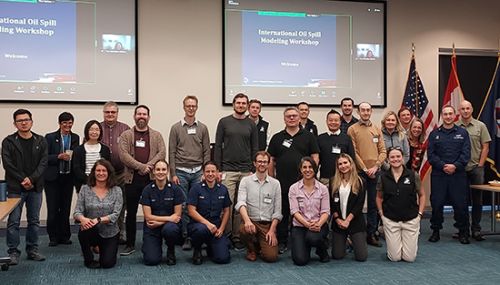NOAA Hosts International Workshop on Oil Spill Fate and Transport Modeling
OCT. 7, 2024 — In late September, OR&R and other oil spill modeling experts from around the world gathered at the NOAA Great Lakes Environmental Research Laboratory in Ann Arbor, Michigan to discuss needed areas of advancements in spill model uncertainty, shoreline and coastal environments, countermeasures, and standardizations.
Leading oil spill model developers from domestic, international, governmental, and industry sectors in nations including Belgium, Spain, Brazil, Greece, Norway, Canada, and the U.S. participated in the workshop. These scientists provided expert input on existing technologies, as well as identified knowledge gaps and potential advancements.
OR&R modelers provided valuable insights on inputs from hydrodynamic models and pathways for improving the capabilities of its GNOME Suite and other oil spill fate and prediction models. Rachael Mueller, Ph.D., presented on the ways in which ocean circulation models can introduce uncertainty in oil spill fate and transport predictions. Christopher Barker, Ph.D., presented on modeling oil-shoreline interactions, the ADIOS Oil Database data model, and data standards to facilitate the sharing of model results. Amy MacFadyen, Ph.D., presented on the challenges of modeling oil in coastal environments, and Dalina Thrift-Viveros presented on the modeling of in-situ burns as an oil spill countermeasure.
Additional NOAA scientists participating in the workshop were James Kessler, Physical Scientist with NOAA’s Oceanic and Atmospheric Research division; OR&R Senior Scientist Lisa DiPinto, Ph.D.; and NOS Modeling Portfolio Manager Tracy Fanara, Ph.D. Dr. Fanara provided valuable insight on resources and recorded information on community needs from hydrodynamic models. OR&R also appreciated the participation of Ayumi Fujisaki, Ph.D. and Yang Song, Ph.D. from the Cooperative Institute for Great Lakes Research.
More information about the workshop is available on the Coastal Response Research Center website. Additional outcomes will include a meeting report and a peer-reviewed manuscript.
The United States Coast Guard Great Lakes Center of Expertise provided funding for the project and the Great Lakes Environmental Research Laboratory hosted and coordinated. The initiative would not have been possible without the hard work of the Coastal Response Research Center.
more images

 An official website of the United States government.
An official website of the United States government.


